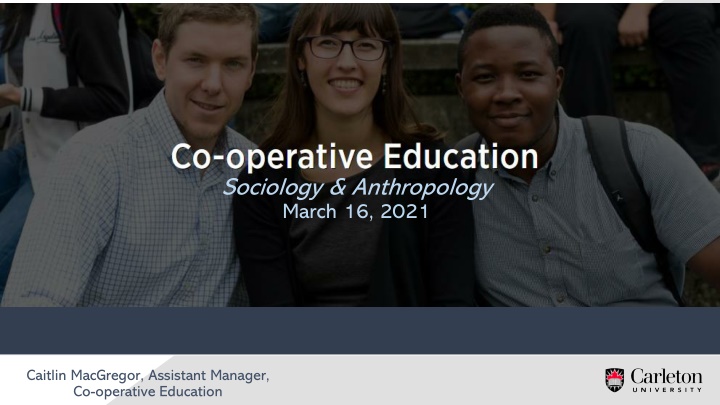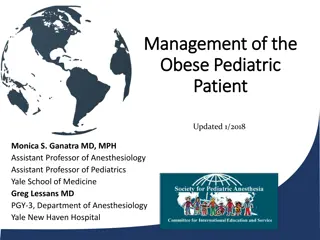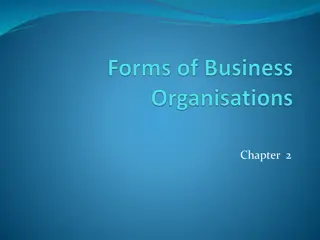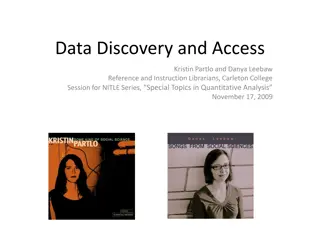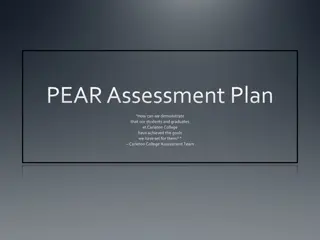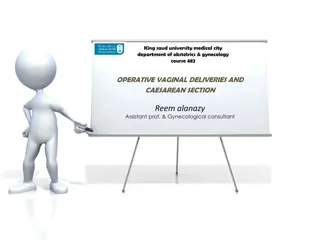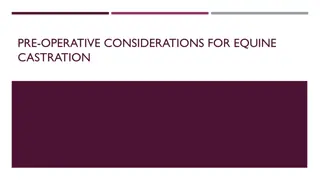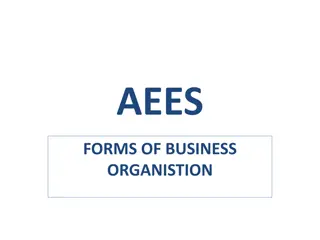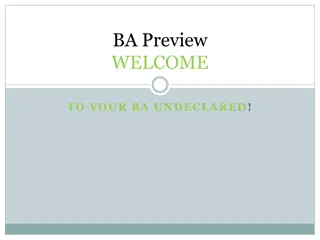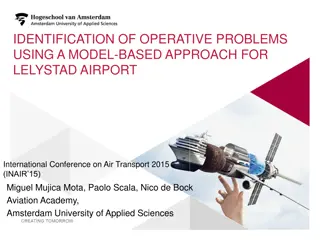Carleton's Co-operative Education Information Session
Learn about Carleton's Co-operative Education program in Sociology & Anthropology, including benefits, eligibility requirements, application process, and how to secure a co-op job. Discover the integrated learning opportunities, paid work terms, and professional growth experiences available through the program.
Download Presentation

Please find below an Image/Link to download the presentation.
The content on the website is provided AS IS for your information and personal use only. It may not be sold, licensed, or shared on other websites without obtaining consent from the author.If you encounter any issues during the download, it is possible that the publisher has removed the file from their server.
You are allowed to download the files provided on this website for personal or commercial use, subject to the condition that they are used lawfully. All files are the property of their respective owners.
The content on the website is provided AS IS for your information and personal use only. It may not be sold, licensed, or shared on other websites without obtaining consent from the author.
E N D
Presentation Transcript
CARLETONS CO-OPERATIVE EDUCATION Sociology & Anthropology March 16, 2021 Caitlin MacGregor, Assistant Manager, Co-operative Education
TODAYS AGENDA What is Co-op? Benefits of Co-op Applying to Co-op Eligibility requirements When do I start? COOP 1000 Securing a Co-op Job Where Can I Work? Co-op Fees What s Next?
WHAT IS CO-OP? An integrated learning program that combines traditional in-class education with hands-on work experience in your field of study 3 or 4 mandatory work terms (4-months each) Full-time, PAID employment Support from Co-op staff while job searching and during the work term OSAP and other provincial student loans do not have to pay interest during work term
BENEFITS OF CO-OP Apply your academic learning Explore career options and work environments Obtain paid, relevant work experience Increase your chances of a job offer upon graduation Grow your professional network and gain valuable references Co-op designation on degree
APPLYING TO CO-OP: Option 1 You selected the Co-op Option when you initially applied to CU Your eligibility will be automatically assessed at the appropriate time If admitted, you will be invited to take the COOP 1000 course If you are not admitted (your CGPA is too low, you haven t earned enough credits, or you re missing pre-reqs), your eligibility will be automatically assessed at the next possible entry point
APPLYING TO CO-OP: Option 2 For those who didn t select the Co-op option when they applied to CU, submit a manual application via mySuccess within Carleton Central If you are not admissible, you can apply again
AM I ELIGIBLE? Third-year standing Minimum Overall CGPA of 7.0 CGPA of 8.0 8.0 Completion of pre-requisites: ANTH 3005, 3007 OR 3008 SOCI 2000, 2001 OR 3000 Once admitted and enrolled in COOP 1000, must register in at least 2.0 credits each term Must maintain CGPA requirement(s) and 2.0 credit registration every study term 7.0 and Major
WHEN DO I START?! The Anthropology and Sociology work-study pattern Year 1 Year 2 Year 3 Year 4 Year 5 Term Pattern Term Pattern Term Pattern Term Pattern Term Pattern Fall S Fall S Fall S Fall W/S Fall W/S Winter S Winter S Winter S Winter W/S Winter S Summer Summer Summer W Summer W https://carleton.ca/co-op/how-does-co-op-work/work-study-sequences/
WHAT IS THE COOP1000 COURSE? A mandatory component of Co-op 8-week online non-credit course Pass/Fail Self-Assessment, Resume, Cover Letter, Interview, Job Search, Transitioning to the Workforce Always taken at least 2 terms before the first work term Does not count towards the 2.0 credit minimum
HOW DO I SECURE A CO-OP JOB? Option 1 Co Co- -op Job board op Job board Online job posting system exclusive to Co- op students High-caliber positions created with students in mind Your academic program will dictate which jobs you can apply to Positions added throughout the term Co-op Office facilitates interviews
HOW DO I SECURE A CO-OP JOB? Option 2 Self Self- -directed job search directed job search Always encouraged Good for specific jobs Good for specific locations Can be found through LinkedIn, job fairs, previous employers, professors, family/friends, etc. Requires Co-op s approval
WHERE CAN I WORK? Just some examples Faculty of Graduate & Postdoctoral Affairs (CU) Immigration, Refugees, & Citizenship Canada Canadian Medical Association Environment & Climate Change Canada Indigenous & Northern Affairs Canada Public Safety Canada Canada Border Services Agency Public Health Agency of Canada Public Services & Procurement Rogers Communications Employment & Social Development Canada National Defense & Canadian Armed Forces
IS THERE A COST TO PARTICIPATE IN CO-OP? Work Term Fees Admin Fees All undergraduate Co-op students are required to pay 4 administrative fees Charged on a pre-set schedule based on your admission to the program Students who secure a Co-op job are registered in the work term course and are charged the work term fee Charge is applied only if/when you secure a work term
WHATS NEXT? Focus on meeting the eligibility requirements If you have not yet applied, be sure to do so Create a LinkedIn account (Career Services) Network, attend virtual events/career fairs, learn about different jobs Consider volunteer or part-time work to gain key employability skills
QUESTIONS? Website: carleton.ca/co-op E-mail: co-opprogram@carleton.ca 15
